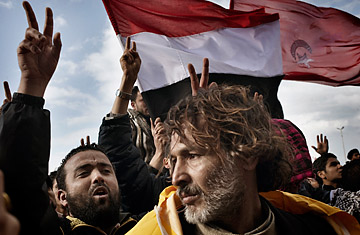
Demonstrators in Benghazi
Is it the End of Days for Libya? "Only the south, Tripoli, and Sert are under Muammar Gaddafi's control," says Mustafa Abd al-Jalil, who, until he quit this week, was Justice minister for the strongman. "East Libya, Zawiya, Misurata, and the western mountains are now under control of the civilians." The ex-minister feels that there may only be one way to end the struggle. "If Tripoli falls, Gaddafi will kill himself, or people close to him will kill him — maybe his guards," he explains. "It will be the waning loyalty of [Gaddafi's sons'] forces and Gaddafi's government that kills his regime."
But even that outcome may not guarantee peace for Libya. Says Dirk Vandewalle, a Libyan expert at Dartmouth University, "Both sides, both the population, and the security organizations, know exactly what's at stake. If government militias [are to] win, they will have to kill many more, and if the security organizations lose, then the people, the regular people in Libya are going to take their revenge." Says Vandewalle: "Either way we're going to see a terrible blood bath. And I think both sides realize this very well and that I think is what really explains the kind of escalating cycle of violence and the very, very brutal actions that we've seen on both sides by now." According to David Mack, a former deputy Assistant Secretary of State for Near East Affairs, the worst possible outcome would be a widespread lawlessness in which Libya degenerated into a kind of "Somalia on the Mediterranean."
Indeed, it is quite possible for Libya to splinter into two or more entities. It has only been a unified country since 1951. Already, the geographical split between opposition and Gaddafi loyalists roughly falls along profound cultural and tribal divisions that go back thousands of years. The East was always more a part of the Greek and Egyptian world while the West was more Phoenician and Roman. Those distinctions were operative at key moments in history. The Italians administered what is now a single country as three distinct units, Tripolitania in the west, Cyrenaica in the east and the arid inland region of Fezzan in the southwest. During World War II, the British were able to rally tribes loyal to King Idris al-Sanussi in the East to fight against Germany's General Erwin Rommel and his Italian allies.
When Colonel Gaddafi came to power in a military coup in 1969 by deposing King Idris, his Revolutionary Command Council was largely composed of military officers and tribes from the western and southern parts of the country who felt neglected by the king.
Under his idiosyncratic rule, the east in turn would end up being neglected, breeding deep resentments, and erupting in early examples of Islamic extremism, mainly in the form of the Libyan Islamic Fighting Group. "As late as 1972 I still thought the country might split up," recalls David Mack, a former deputy Assistant Secretary of State for Near East Affairs who spent three years in Tripoli during the early years of Gaddafi rule as a translator for the U.S. ambassador during his meetings with the then 27-year-old colonel. "It still could, especially if there is a prolonged separation of Cyrenaica from the rest of the country."
Gaddafi's vendettas had only deepened the sense of neglect and oppression in the eastern part of the country. The colonel had survived an assassination attempt on his convoy while traveling in the east and responded with heavy-handed fury. The government napalmed suspected hideouts of his opponents. He also executed 1,200 prisoners, most of them from the east, in Abu Salim prison. Simmering outrage over those deaths played a key part in triggering the successful rebellion in Benghazi, the recent arrest of a lawyer who represented victims' families providing the spark. "To any one who knows Libya there is no surprise that the uprising would start in the East — this area has always been the problem [for the regime]," says Ethan Chorin, who served as a commercial counselor in the U.S. Embassy until 2006.
Benghazi, the neglected metropolis of Cyrenaica, has seen locals waving "independence" flags since shaking off Gaddafi's hold. Says Lisa Anderson, President of the American University of Cairo, and an expert on Libya: "It has been an aspiration of the people of Eastern Libyan to be independent of the people of Tripolitania for the entire 20th century." Union with Tripoli was, she says, a marriage of convenience, a way to win independence from the Italians after the British took control during World War II. Otherwise, "they didn't want to, they never wanted to" be federated with western Libya. Mack, however, notes that that few Libyans today would choose separation since a sense of nationalism has developed over the last few decades. And it would not be very practical. Libya as a whole has less than 7 million inhabitants. Eastern Libya, if it separated, would have just 1.5 million people.
